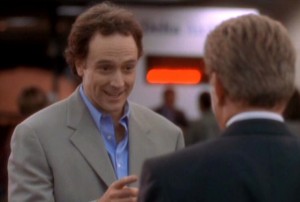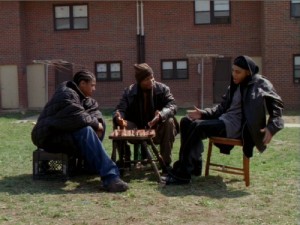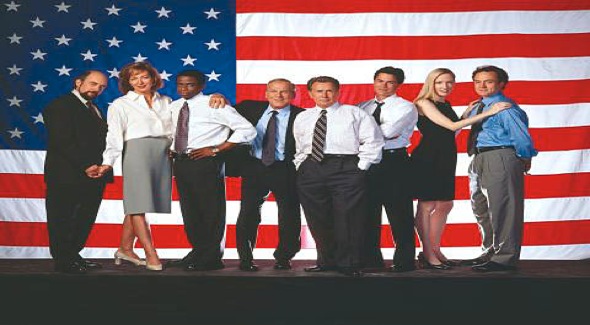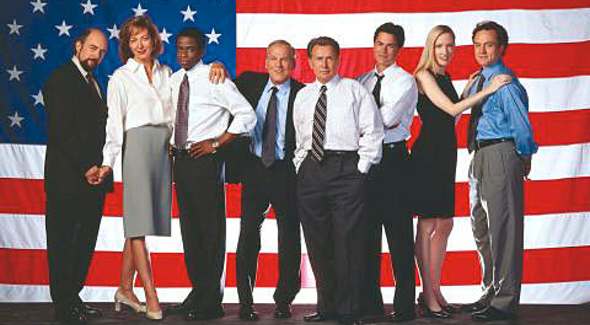In the face of such a supernatural power, the appropriate response, of course, is faith. Lyman sees Bartlet give his amazing speech and he believes. But even greater than Lyman’s faith is Seaborn’s, who sees Lyman react to Bartlet’s speech and is convinced to jump ship as well. Similarly, Cregg is willing to pack up and move east based on Ziegler’s conviction that Bartlet is a good man.
But faith doesn’t merely inspire decisions. Having faith is a transforming alchemical process. Donna has no real experience with a political campaign and little grounding in her life, but she believes, more than anything, that she can help Lyman. “I think I can be good at this,” she says. “I think you might find me valuable.” On that, and on the look in her eyes, Lyman is willing to take her on.
As a public service announcement to the students who read us, let me assure you: this never works.
Throughout the S2E2 flashbacks, we’ve also come to grips with Bartlet’s stubborn grumpiness: his tendency to snap at subordinates when pushed to a conclusion he doesn’t like. Lyman and McGarry correctly diagnose this as stage fright: Bartlet’s fear of the pressure of running for President. At the end of the episode, after seeing Lyman off to the airport, Bartlet turns to McGarry and says, “I’m ready.” Not, “I need your help” or “We can do this” or “I have a secret plan to turn this country around” (all of which are implied) but “I’m ready.”

“The readiness is all,” to use the same line from Hamlet that Martin Sheen himself uses in The Departed. What distinguishes these characters from other characters is not their qualification for the job. Lyman’s a Congressional aide for Hoynes, but Congressional aides can be bought in bulk at the Falls Church Costco. Ziegler, as he confesses in a bar in New Hampshire, has zero successful political campaigns under his belt. Seaborn is coming off a stint as a corporate lawyer and Cregg has just been fired. The only thing that qualifies them for their job is the choice to take it. They saw the light – the promise of putting a good man in the White House – and chose it with enthusiasm.
To step out of analysis mode and into personal taste for a moment: this is what bugs me the most about The West Wing. The West Wing is about the Presidency of a man who perfectly embodies middle-class liberal values. I’m bothered not because I find those values distasteful, but because the man championing them is such an avatar. He’s as realistic as John Galt, the hyper-rational embodiment of Ayn Rand’s values in Atlas Shrugged. I can’t picture Bartlet smoking a cigar, or yelling at a valet, or coming to work upset because the Patriots lost last night, or anything else that doesn’t flow organically from his beliefs. (I may be proven wrong later this season, but that remains to be seen)
If The West Wing is supposed to get me excited about democracy or America again, Bartlet is the wrong guy to do it. If the system needs a perfect man surrounded by a perfect team in order to work, then the system doesn’t really work. I would be much more impressed with a show about a centrist compromiser and his team of shopworn hacks who happen to produce progressive policy against everyone’s expectations. But I don’t expect that.
And yet.
I kept comparing The West Wing to The Wire while watching. This is an unhealthy habit and one that’s unfair to Sorkin. Since I already believe that The Wire is the single greatest thing that the medium of television has yet to produce, every other show will pale in comparison.
But keeping the comparison in mind forced me to be honest. Both The West Wing and The Wire rely on ensemble casts. Both are about ancient offices that most Americans think they understand (the Presidency; cops and crooks) but still have a lot to learn about. Both grapple with serious issues. And while Leo McGarry’s pronouncement of “Don’t mess with us tonight” may be sententious, it’s no worse than “This is Baltimore, gentlemen; the gods will not save you,” spoken by Deputy Commissioner Burrell in S1 of the latter show.
Finally, watching the team put up with Bartlet’s crankiness in S2E2, the parallel hit me: The West Wing is The Wire if Baltimore were a person.

Just once, I'd like to see a non-allegorical game of chess played in pop culture.
After a few seasons of The Wire, the endemic institutional failures of the city of Baltimore start to grind on you. The cops can’t get their job done, because the Mayors who appoint their commanding officers need headlines to get elected. Workers can’t feed their families because Baltimore is no longer a sustainable port. Kids can’t get enough education to break the cycle of poverty. After a while you will doubtless turn to your significant other and say, “How can anyone live there?”
And I get that. But as a Baltimore native, The Wire speaks to me on a far more personal level. That’s not just some fictional narrative about a city falling apart; that’s my hometown. That’s where I grew up. That’s my actual city sliding into the abyss, even if some of the names and faces are changed for HBO. And while I’ve moved away from Baltimore, I can’t turn my back on it.
Josiah Bartlet occupies a similar role in The West Wing. All the other characters are trying to make sense of him, figure out how to live with him, and live up to the potential he represents while gritting their teeth at his foibles. He’s an infuriating aspirational figure. Everyone wants to be worthy of him, even as they also wish he would sometimes shut up and get out of their way.
Being able to slot characters into those positions gave me the resolve to go on. So I’m not abandoning the experiment yet. More The West Wing next time, Overthinkers.
Appendix:
-
S2E2 begins with a skinhead watching the early morning news of the President’s assassination, smirking around his cigarette. As he puts out the butt in his fried egg, we see a swastika tattooed onto the fleshy part of his thumb. I wonder if this is a bad guy. Were there frames on the cutting room floor where he kicks a box of kittens into a Girl Scout?
-
I could not care less about the National Security Letter that Barlet was supposed to sign before going under, or why Bartlet didn’t leave under a tent, despite S2E2’s efforts to make me care very much. The idea that lack of legal precedent would stop a President from doing something seems quaint in the Age of Terror, for one. And not only do I not care about the policy implications, I don’t care about them as sources of drama. No one is taking the Oval Office to task for not having answers on these issues, except for some gentle, slow-pitch, compassionate questioning by Danny Concannon. What would be the consequence of leaving these questions unanswered for a day, or a week, or for all time? I sincerely hope that no further screentime is wasted on these.
-
No one in the Sorkinium is ever at a loss for statistics. Seaborn can rattle off the specs of oil tankers without pausing for breath or referencing his notes. Cregg has her overnight shooting stats right at her fingertips. It’s a writing conceit, of course, but I like it. It makes people seem smart and TV needs more of that.
-
When Bartlet was delivering his dry economic answers in Nashua, muted in the background while Ziegler is grilled by a campaign manager, I wrote down “Bartlet = Ron Paul for Dems” in my notes. Tell me I’m wrong.


Aw, this is why I’m sad you didn’t watch season 1 before season 2. If I’m recalling correctly, in season 1, Bartlet was a stereotypical Dem in that he had the right ideas but never stepped up to fight for any of them. And, as you said, he didn’t know how to connect with people. So at the end of the first season (which was the end of his second year in office) nothing of substance had gotten done – he was merely a “caretaker president.” The big turning point of the season was when everyone finally agreed that he needed to stop letting everyone walk all over him. It was only then that he became Messiah Bartlet.
So yeah, in season 2, he’s kind of a liberal messiah figure. But I think it works, mostly because a large section of this season is about him doing something pretty bad. In general, though, I think too many people who criticize The West Wing focus only on the Bartlet character (who at the beginning of first season was just a bit player). For me, the fun was always in watching the rest of the gang work. All of them, certainly, are flawed.
Speaking of the rest of the gang, I’d be interested to see who you and our readers identify with, because that changed for me between the first time I saw the show (when I was 15) versus when I rewatched it as an adult. (For the record, as a 15 year old, I luuuurved Josh. As an adult, I usually wanted to strangle Josh for being the asshole who thinks politics is just a game, and I knew in my heart that I was Toby, the grumpy Jew.)
These two episodes in particular feel sappier than (I hope) the rest of the season. I want gamesmanship! I want dirty politics!
Trust me, there is plenty of gamesmanship and dirty politics in the series. You just had the misfortune of having the first two episodes you view be flashback heavy and take place mostly outside the White House.
The West Wing is about the Presidency of a man who perfectly embodies middle-class liberal values. I’m bothered not because I find those values distasteful, but because the man championing them is such an avatar. He’s as realistic as John Galt, the hyper-rational embodiment of Ayn Rand’s values in Atlas Shrugged. I can’t picture Bartlet smoking a cigar, or yelling at a valet, or coming to work upset because the Patriots lost last night, or anything else that doesn’t flow organically from his beliefs.
Actually the series does address. One of his flaws as a politician is that he grew up wealthy and has little interest in “regular guy” activities. It was addressed early in season 1 when a member of Congress says he will only vote in favor a bill if the President agrees to be photographed playing golf with him, only to have Josh or Sam reply that the President doesn’t play golf… he plays chess.
Later it will become a major issue in season 4 which is dominated by the his reelection campaign.
As for the president and the staff being “perfect”, they aren’t. They make big big mistakes that cause major damage (both political and non-political).
They make big big mistakes that cause major damage
Yeah, but so did Agamemnon; that doesn’t make the Oresteia realistic. :-p
Point taken, but they really are plausible in this series. Without getting too specific, in season 4 Josh wrecks a bill (and damages Bartlet’s reelection chances) when he misreads a Senator’s public statements, which were intended to give a Bartlet a convenient political target (i.e. Congressional obstruction), and goes after the Senator himself.
Funny you should mention those specific things, because Bartlet is repeatedly shown to smoke cigarettes, and on at least one occasion gets upset because Notre Dame loses. And I’m sure he yells at Charlie though I can’t remember when or for what.
I just saw “In This White House,” in which Bartlet slums it in the Communications Office on Saturday morning in a Notre Dame sweatshirt. So that’s something!
There is some back story to the episode that supports your point – Charlie’s mother was a DC cop killed in the line of duty by “cop killer” bullet that would ostensibly be illegal under stricter gun laws that the main characters would like.
Though at the time the series was promoted as being an inside look at how the staff really might operate, and had people like Lawrence O’Donnell on staff to inform the writing by true experience, the overly on-the-nose kind of plot conveniences are probably more Sorkin’s attempt at Shakespeare via Seinfeld A/B/C plot merging fugues than an attempt to reflect perfectly his politics.
Those kind of syncopating plot beats might not be entirely unrelated to his taste for mushrooms… coincidences self-assembling a structured narrative that rushes to moments of sudden illumination.
My impression is that Sorkin wrote high-concept plots that were converted from bombast to good drama by the talent of the cast and the deep knowledge of the researchers and cowriters.
That sentence you reference doesn’t mean anything because it’s a sentence fragment. But the meaning of the whole isn’t difficult to puzzle out. First, it’s a conditional, of course:
If (fidelity to freedom of democracy is the code of our civic religion) then (surely) (the code of our humanity is faithful service to that unwritten commandment that says we shall give our children better than we ourselves received).
The “freedom of” here is a bit gratuitous, but not ungrammatical. “fidelity to democracy is the code of our civic religion” seems fine. Democracy is a way of going about things, fidelity _to_ that way of going about things can be said to be a code — you shall go about things this way. So this proposition is roughly “we believe in democracy”, but phrased using religious metaphor.
“the code of our humanity is faithful service to that unwritten commandment that says P” extends the metaphor. We were talking about a “the code of our civic religion”, now we’re talking about “the code of our humanity” — so ethics as opposed to political philosophy. “faithful service to …” is parallel to “fidelity to …”. “that unwritten commandment that says” puts a bit more of a religious gloss on the ethical claim — suggesting it is of the same order of the written commandments. The ethical proposition itself is “we shall give our children better than we ourselves received”, which is straightforward.
So, the sentence expresses something like “if we are committed to democracy, then we are also committed to giving our children more than we had”. The phrasing is meant to bring religion to mind — and more particularly that not all ethical or religious commitments are written down. (Factually, the claim is almost certainly false as a necessary implication. But if we’re being picky, then if the consequent is true the whole is true considered as a material conditional.)
Or perhaps you were being facetious.
On any other website on the Internet, you would be roundly criticized for giving that level of detail in your response. Here, we say: “welcome home.”
Anyhow, there was a punchier way to say it, is my point.
I dig on the effort there, but I think the problem is linking the two thoughts. He starts with “If,” which means that, somehow, being committed to democracy must also mean being committed to giving our children more than we have. This seems like a non-sequitur. They’re both, ya’ know, really nice and good things, but I don’t see how the former demands the latter.
“I can’t picture Bartlet smoking a cigar, or yelling at a valet, or coming to work upset because the Patriots lost last night, or anything else that doesn’t flow organically from his beliefs. (I may be proven wrong later this season, but that remains to be seen)
If The West Wing is supposed to get me excited about democracy or America again, Bartlet is the wrong guy to do it. If the system needs a perfect man surrounded by a perfect team in order to work, then the system doesn’t really work. I would be much more impressed with a show about a centrist compromiser and his team of shopworn hacks who happen to produce progressive policy against everyone’s expectations.”
The thing is, pretty much everything you’ve said there does happen, at least in my recollection of the show. Bartlett smokes on the sly when he’s stressed, he yells at people, and he does get into bad moods because of sports and other minor things. A lot of the time this is done in a somewhat stilted manner, but it’s there.
Moreover, though, what you’ve missed in those two episodes is (to me, at least) one of the most essential parts of the show’s premise: that Bartlett is a Democrat president, but the Republicans have majorities in both houses. In his first term, he didn’t even have a majority of the vote. And that’s basically how the show works, with the protagonists constantly having to compromise and struggle to do anything at all. Every time I’ve watched it, the thing I’ve have most difficulty believing is the constant assertations that Bartlett’s staff, especially Lyman, are actually these supremely capable political operators, because they never seem to get anything done and get sidetracked and blindsided by every little thing you can think of.
But despite this, the fact that they are continually stymied by America’s governmental system, they all do support it. I’m not sure what that’s saying about the system.
Ugh, please don’t write “Democrat president.” The grammar nut in me can’t stand it. The adjective is “Democratic.” Nice comment otherwise, though.
I totally understand that it’s not grammatically correct, but the term “Democratic president” has too much precedent as a term meaning “President elected democratically” to read as “President who ran as a Democrat.” I’m not usually one to concede this, but that might be a case where language has gotten adapted to better serve the purpose of understanding.
Nice rundown, good idea. Looking forward to the others. This might convince me to go back and watch the season for a third (or fourth; not sure) time. I agree with almost all of it. Some random thoughts and addendums:
1) You’re dead-on with the fantasy Bartlett is meant to represent. This is a common political delusion: that if only our ideals were articulated the right way, everyone would see how wise they are. I’m not sure if this is more prevalent on the left or the right, but it’s clearly going on here, and it’s clearly silly. No, Mr. Sorkin, the problem is not messaging or PR. The problem is that smart people are perfectly capable of being reasonable and still disagreeing with each other, because reality is freaking hard.
2) Why the crap would voting against milk subsidies make it easier to buy milk? I don’t generally dig on subsidies, but I think Sorkin’s economics might be backwards here. There are plenty of arguments about the long-term effects of such subsidies, and you could make a strong case that milk subsidies will make milk scarcer at some point, I suppose, but I’m not sure how you could pretend that getting rid of them would make milk cheaper, at least not any time in the near future. Assuming I’m not missing something obvious, I guess you could say this is the inevitable problem when a character has a Nobel in Economics but the person writing them most emphatically does not.
3) The gun control argument is kind of goofy for all the reasons you say, but also because the pro-gun argument isn’t “if you have a gun nobody can ever hurt you.” If someone wants to get YOU, specifically, then they probably can. But most gun owners aren’t trying to deter a highly-organized, highly-motivated group of political extremists, they’re just trying to deter random assailants or thieves, none of whom are likely to give a crap who they’re going after, and who would smartly and gladly move onto the next victim if they felt they were less likely to be armed.
I should add that the milk subsidy thing could make sense if it’s accompanied by some kind of trade restriction, like sugar subsidies are. But seeing as how Bartlett was a Governor at the time, and not President, I’m not sure what kind of restriction could be there.
He might be gaming it out really, really far: the subsidies first LOWER the costs, people buy far more of it, creating artificial shortages, which in turn raises the price. You could also say that the subsidies discourage innovation. That’s gaming it out pretty far, though.
One thing which always bothered me about Sorkin’s stories is that his characters are constantly sacrificing their own self-interest to stand up for their principles, but then they’d get the reward they thought they’d given up anyway. It’s been many years since I saw a WW episode, but I seem to remember most of them going like this: a character would be tempted to do something expedient, would wrestle with his conscience, and ultimately decide to do the right thing, but then the principled action, which everyone thought would cost them votes or political capital or whatever, turned out to be even more successful than the expedient qaction. It was a show about “big moral dilemmas” which always turned out to be nothing, because there were never any consequences–unless you count “even more success” as a consequence of sticking to your principles. The drama is supposed to be about the “tough choice” between following your conscience and getting the big payday, but the choice stops being tough if following your conscience actually leads to an even bigger payday.
After reading your post last week and mulling it over a few days, I was struck by the similarities between Bartlet and. . . wait for it. . . David Palmer from 24.
Now, I’ve never seen West Wing, so I’m just going by what I read in Perich’s article and the comments, but this idea of a charismatic, idealistic, and almost messianic presidential figure really seems descriptive of Palmer in the early seasons of 24. Given how to many people, 24 seems synonymous with right-wing conservative politics, I’d be interested to see a breakdown of how Palmer – also a democrat – embodied the idea of an effective, moral political figure we all wish we had but never quite do in real life.